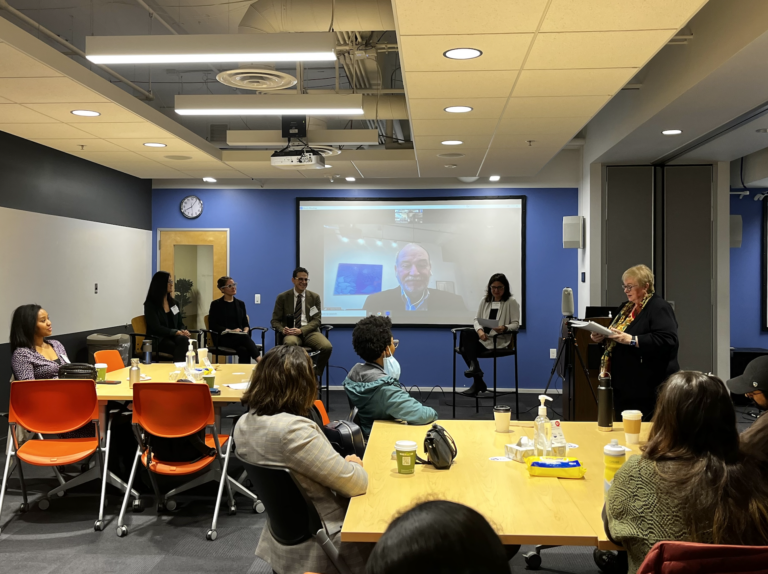
- Kim Kisner
- Events
- 10/24/2023
Experts on Clean Energy and Infrastructure Weigh in on Opportunities for Businesses at SBND Event

The Inflation Reduction Act of 2022 marks the single largest investment in climate and energy in American history and provides potentially transformational opportunities for businesses and organizations of all sizes.
On October 17, SBN Detroit hosted an informative discussion regarding these opportunities as well as those under the Infrastructure Investment and Jobs Act of 2021. The discussion focused on clean energy programs, available resources, workplace infrastructure, integrating different forms of funding, and partnerships. A list of resources is at the end of this article.
The panelists were:
Jerry Davis, professor, Ross School of Business, University of Michigan, oversees +Impact Studio and is faculty director of Business + Impact.
Stacey Grant, principal and founder of Path Consulting, which offers equity-centered consulting support for communities, organizations, and nonprofits.
Elizabeth Wallace, associate director, Michigan Community Programs, Elevate Energy
Zachary Kolodin, chief infrastructure officer, State of Michigan
The event was moderated by Nina Misuraca Ignaczak, founder, publisher, and editor of Planet Detroit, a digital media startup with a mission to produce quality climate, equity, health, and environmental journalism in the public interest.
Takeaways follow:
- Kolodin: Michigan is a model for the country. Our main goals are to make sure the state gets internal justice for our projects and to bring in quality jobs. It is a great time to be in state government.
- Grant: The funding and resources are meant to benefit your communities. We need to advocate and make this happen, and we can do this in a data-driven way.
- Davis: The IRA is like gelato. There are thousands of programs and a lot of acronyms. There are also some great resources to look at that are specific to Michigan. It’s really important to familiarize yourself with the basics of what is out there.
- Grant: We are talking about funding that isn’t a cycle. It is rolling out through 2032. This is a moment, but we are also talking about longevity. If you are not in the game, you can still get in the game, and win the game.
- Kolodin: When we talk about workforce infrastructure in this space, we often miss the capital needed. When we look at skills, when we look at humans, we fail to look at access to capital and replicating the needed qualities for the replication of these skills in the workforce.
- Kolodin: The IRA creates obvious funding opportunities to create a low-interest capital fund to support entrepreneurs in this space. We need to look into how to create a fund like this and get access to capital. We need to get creative to get money where it needs to be.
- Wallace: Through the IRA, there is the greenhouse gas production fund. This is funding that is going to capitalize on these clean energy products. There is pro-bono technical assistance and legal support for communities and residents to try to alleviate the complexity if you are a business owner looking to do energy projects.
- Wallace: There are a lot of incentives for cities to partner with other cities, community organizations, and local businesses.
- Davis: It’s important to focus on mid-management. Commitment from senior leaders matters, but midlevel leaders and managers make the difference day-to-day.
- Michigan Saves is a great resource. I felt they were really helpful specifically for contractors because there are so many details in the IRA – and they simplified things greatly.
- Wallace: If you are looking to receive capital, there are a lot of different ways to get into the programs and the funding that is coming from the IRA. Keep an eye on what is going on locally and regionally and see where some of these things align with your organization and if you want to expand into it.
- Wallace: It’s a time to really collaborate with other organizations with similar goals and local, state, and regional governments to see what programs are coming down the line that may be beneficial for your organization.
- Grant: We are dealing with crises daily. A shift in power is required. I invite people who are in positions of power and who have access to information and resources to make themselves available. If you do not have that invitation, then you need to create that relationship.
Click here for a list of resources.
Be sure to subscribe to our newsletter for regular updates on sustainable business practices in and around Detroit.
Kim Kisner
- All
- Business
- Community
- Education
- Events

Unique Monique Scented Candles, a Detroit-based business founded by Monique Bounds., aims to produce candles and household products with clean ingredients and local supply chains. What began as a personal hobby during college has evolved into a full-time venture producing coconut oil and soy-based candles made with essential oils and locally sourced materials. SBN Detroit interviewed Bounds about launching a sustainable product line, sourcing challenges in Michigan, and...

Eastern Market Partnership, in collaboration with the City of Detroit’s Office of Sustainability Urban Agriculture Division, has announced $240,000 in grant funding to support Detroit-based farmers and farmer collectives. The grants will advance food access, climate education, sustainable land use, and economic opportunity, with priority given to Black- and Indigenous-led farms, youth-led initiatives, and projects rooted in historically disinvested neighborhoods. The recipients – ranging from cooperatives and community...

Citizen Robotics is a Detroit-based nonprofit that advances the use of robotics and digital manufacturing in residential construction, focusing on improving productivity, sustainability, and long-term affordability. Best known for its early work in 3D-printed housing, it explores how alternative construction methods and new financial models can reduce material waste, lower lifetime operating costs, and enhance the resilience of homes. SBN Detroit interviewed Tom Woodman, founder and president of...







